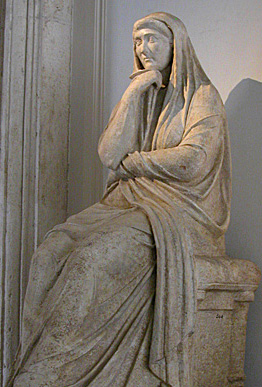 Republican funerary statue |
The glory of Marcia's appearance, conduct and lineage is the
subject of the closing lines of Book 6 of Ovid's Fasti, a work he began
before his exile in 8 CE. Despite the praises of the muse
Clio for Marcia's beauty, these
lines are less a tribute to this noblewoman's attributes than to the males of
her family. Through her, Ovid honors not only her husband, his patron, Paullus
Fabius Maximus (46 BCE-14CE;
consul 11 BCE), but
Augustus as well, for Marcia was Augustus'
maternal cousin through a complex web of relationships. Her mother, Atia minor,
was the sister of Augustus's mother, Atia maior; both were daughters of
Julius Caesar's sister Julia. Atia maior married
L. Marcius Philippus maior (consul 56 BCE) after the death of Augustus'
biological father, Gaius Octavius, in 58 BCE, while her sister, Atia minor,
Marcia's mother, married L. Marcius Philippus minor, his son by an earlier
marriage. In 14 CE Marcia bitterly grieves at her husband's funeral; ironically he was
forced to commit suicide after she told her friend
Livia about his secret trip with Augustus to
reconcile with his exiled heir and grandson
Agrippa Postumus (see Tacitus,
Annales 1.5.3, in State). The passage
below closes Book 6 and June,
Juno's month, on the
29th (ante diem III Kalendas Iulianas), the
day sacred to Hercules Musarum (on
denarius of Q. Pomponius Musa, 66 BCE). The round
temple of Heracles Musarum
(see lost
frgt.31eeff) is located on the
Forma Urbis
Romae (frgt. 31bb) near the
Portico of Octavia and the
Portico of Philippus (frgt. 31u). The poem is written in elegiac couplet, a pattern
of alternating dactylic hexameter and pentameter lines (see
illustration). |
| sic ego. sic Clio: "clari monimenta Philippi | ||
| Marcia, sacrifico deductum nomen ab Anco, | ||
| 805 | par animo quoque forma suo respondet; in illa | |
| nec, quod laudamus formam, tu turpe putaris: | ||
|
laudamus magnas hac quoque parte deas. |
||
| nupta fuit quondam matertera Caesaris illi: | ||
| 810 |
Click on the underlined words for translation aids and
commentary, which will appear in a small window. Click on the icon link
![]() to the right of the
poem for related images and information.
to the right of the
poem for related images and information.